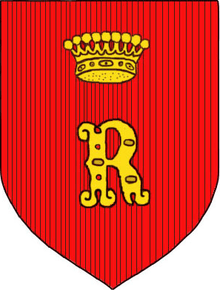Rakaw
Rakaw (Belarusian: Ракаў Rakaw; Russian: Раков Rakov; Polish: Raków) is an urban settlement in Valozhyn Raion, Minsk Region, Belarus.[1] It stands on the river Islach 40 km (25 mi) from Volozhin and 39 km (24 mi) from Minsk, the capital of Belarus. Population about 2,100 (2006).
History

This place has been inhabited since ancient times. This was proven when the settlement 'Valy' ('Валы') was found here on the river Islach. In the 16th century these ruins were used as a platform for feudal castle building. The Rakov castle can be found on the map created by Tomash Makovski in 1613. In the 14th century documents, settlements near contemporary Rakov are mentioned for the first time. Rakov itself is mentioned in 15th century chronicles. In 1465 Kazimir Yagelon gave Rakov as a gift to the Grand Duchy of Lithuania chancellor Mihail Kyazhgailo. Kyazhgailo's family owned Rakov for almost 100 years. Only in the middle of the 16th century Rakov went to Zavish family as a part of inheritance. In the 17th century the village belonged to Sangushki family. They constructed there a Dominican Catholic cloister in 1686 and a wooden castle, the Basilian Uniat cloister, in 1702.
Some sources state that by the end of the 18th century Rakov belonged to the Oginskiya family. At that time, the territory of Belarus was a part of Rech' Pospolitaya. And this was the time when the Belarusian territory was divided between Rech' Pospolitaya and the Russian Empire three times. Difficult political situations provoked Kastus Kalinovsky Rebel in 1863–1864. There is information that the famous composer Mihail Kleofas Oginski participated in it. To punish the rebellious Oginskiya family, the Russian Empress Catherine the Great (Catherine II) took Rakov from Oginskiya and gave it to General Saltykov.
In 1793 Rakov become a part of the Russian Empire. Also in 1793 the first stone castle was built in Rakov. After Kastus' Kalinovski Rebel it was turned into an Orthodox Our Saviour and Transformation church. To do this they removed towers and built a cupola. This church still exists.
In 1804 the Zdzehovskiya family bought Rakov from Saltykov and owned it until 1939. This was the time of prosperity in this place. In 1843 they opened manufactures to produce agricultural machines. By 1880 about 16 glass manufactures worked in Rakov. The village had Magdenburg rights and privileges. There were two watermills, brick manufacture and lumber mill, postal telegraph office (its ruins still remain). By the end of the 19th century the population of Rakov was about 3,6 thousand people, almost 60% of them were Jews.
In 1904–1906 the construction of the Mother of God Rosaria and the Holy Spirit castle was finished. It was done on donations of the local people and it is an example of Neo-Gothic architecture.
In 1915 the local citizen Nevah-Girsha Haimov Pozdnyakov organized automobile shipping between Rakov and Zaslavl', a nearby town.
After the Treaty of Riga of 1921 was resumed on 21 September, Rakov appeared to be a part of Poland. It was the center of the Vilna voevodship volost'. Finally Rakov become part of the Soviet Union and Belarus in 1939 when the Soviet Army invaded Poland according to the Molotov–Ribbentrop Pact.
Sightseeing
Glacial conglomerate near the root Minsk - Volozhin.
Ancient settlement
Jewish cemetery (1642)
Our Savour and Transfiguration Church (1793)
Catholic St. Ann Chapel (1862)
Orthodox cemetery brama (19th century)
Mother of God Rosaria and the Holy Spirit kostel (1904–1906)
Crypt-burial vault of Drutskiya-Lubetskiya
Felix Yanushkevich Ethnographic museum.
Notable residents
- Vyachaslau Ragoisha, translator, author articles about history of Belarusian literature
- Jazep Januszkiewicz, coauthor of a book about the history of Belarusian literature, writer
- Avraham Kalmanowitz, Rav of Rakov
- Ida Rosenthal
References
- Rakaw (in Belarusian)
External links
- The murder of the Jews of Rakaw during World War II, at Yad Vashem website
- Rakov, Belarus at JewishGen
| Wikimedia Commons has media related to Rakaŭ. |